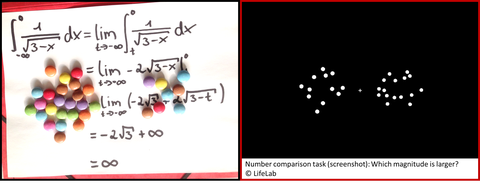Number Sense & Motivation
Math skill learning – neurocognitive mechanisms of effects of performance monitoring and motivation
THEORETICAL BACKGROUND
Promoting mathematic abilities is of great importance for modern lives in the technological and digital world. Accordingly, there has been increasing interest in factors that determine a person’s mathematic abilities and corresponding educational and occupational success. Previous research suggests that the precision of the approximate number system (ANS) – a system that perceive, approximates, represents and distinguishes magnitudes – and its development play a determining part in our later academic achievements. Training of the ANS can improve other mathematic abilities, for instance arithmetic fluency. There are already successful training programs using tasks from various areas to improve mathematic abilities. However, a systematic investigation of (1) the impact of performance feedback and incentive motivation on training effects, (2) the elementary processes (e.g., ANS precision) and neurocognitive mechanisms underlying the effects of feedback and motivation on training gains and (3) developmental differences in effects of such modulations is pending. Gaining new insights about these processes are necessary to enhance the effectiveness of training programs and also their suitability for different age groups.
PROJECT AIMS
- Modulating math skill acquisition and elementary processes of mathematic abilities using performance feedback and motivational incentive
- Identifying neurocognitive correlates of such modulations
- Investigating developmental differences in the brain-behavioral relations
Principal Investigators
- Prof. Shu-Chen Li, Ph.D.
- Dr. Annika Dix (Chair of Engineering Psychology and Applied Cognitive Research)
Current Research Students
- Susi Schmidt
- B.Sc. Philipp Schuster
- B.Sc. Esther Voget
Selected Project-Relevant Publications
Dix, A., & van der Meer, E. (2015). Arithmetic and algebraic problem solving and resource allocation: The distinct impact of fluid and numerical intelligence. Psychophysiology, 52, 544–554. doi:10.1111/psyp.12367
Hammerer, D., Muller, V., & Li, S. C. (2014). Performance monitoring across the lifespan: still maturing post-conflict regulation in children and declining task-set monitoring in older adults. Neurosci Biobehav Rev, 46 Pt 1, 105-123. doi:10.1016/j.neubiorev.2014.06.008
Stormer, V., Eppinger, B., & Li, S. C. (2014). Reward speeds up and increases consistency of visual selective attention: a lifespan comparison. Cogn Affect Behav Neurosci, 14(2), 659-671. doi:10.3758/s13415-014-0273-z

